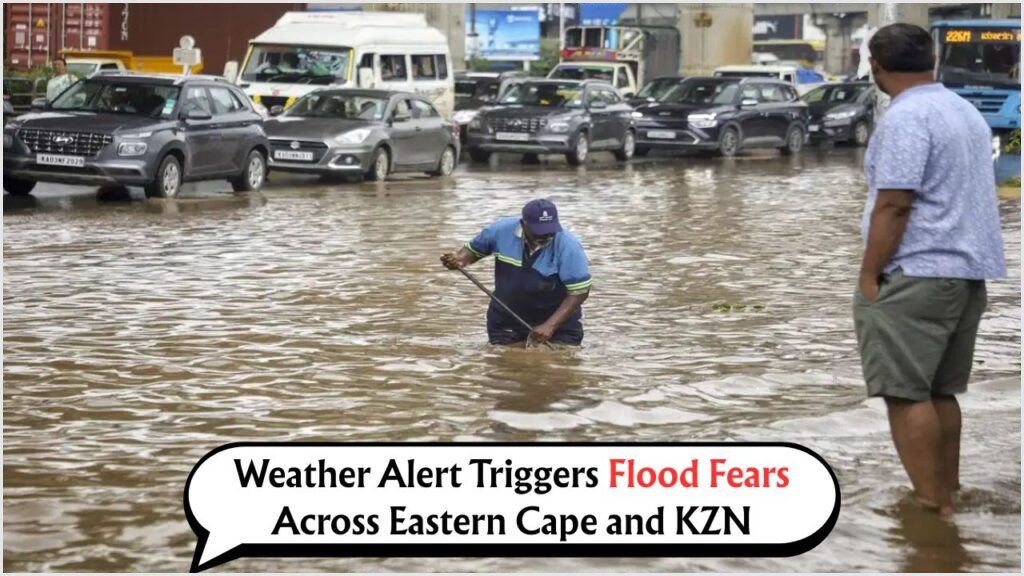South Africa’s Weather Alert: Prepare yourself as South Africa faces a significant weather alert, forecasting heavy rain from 7–10 August. The South African Weather Service has issued warnings about potential disruptions across various regions. Residents should brace for impact as torrential rain may lead to flash floods and other weather-related hazards. With climate change contributing to more frequent and severe weather events, it is vital to stay informed and prepared during such periods. This article explores the impending weather conditions, their potential impact, and how South Africans can stay safe and informed during this challenging time.
Anticipated Weather Conditions in South Africa
From 7–10 August, South Africa is expected to experience heavy rainfall, with some areas potentially receiving significant precipitation within a short period. Meteorologists indicate that the eastern and southern coastal regions, including KwaZulu-Natal and Eastern Cape, are likely to be the most affected. Residents in these areas should be particularly vigilant as the deluge may lead to localized flooding and landslides. The weather alert calls for caution, especially in low-lying areas and near water bodies, as the risk of flash floods increases. The heavy downpour may also cause disruptions to transport, infrastructure, and daily life, requiring communities to remain alert and prepared for any eventualities.
- Heavy rainfall expected across coastal regions.
- Potential for flash floods in low-lying areas.
- Risk of landslides in hilly regions.
- Possibility of transport disruptions.
- Impact on local infrastructure.
- Increased caution advised for residents.
- Monitor weather updates regularly.
Preparing for South Africa’s Heavy Rainfall
To mitigate the impact of the upcoming heavy rains, individuals and communities should take proactive steps. Ensuring that drainage systems are clear of debris can help prevent water accumulation and potential flooding. Residents should also secure outdoor furniture and structures that may be affected by strong winds and heavy rain. Stocking up on essentials such as food, water, and emergency supplies is crucial in case of prolonged disruptions. Moreover, keeping abreast of weather updates through reliable sources, including the South African Weather Service, is imperative for timely information. Community leaders and local authorities should work together to disseminate information and provide support where needed, ensuring that vulnerable groups are not left behind.
| Preparation Step | Action Required | Impact Mitigation | Community Support |
|---|---|---|---|
| Clear Drainage | Remove debris | Prevent flooding | Coordinate clean-ups |
| Secure Property | Anchor outdoor items | Minimize damage | Share resources |
| Stock Essentials | Gather supplies | Ensure self-sufficiency | Assist vulnerable groups |
| Stay Informed | Follow updates | Timely response | Disseminate information |
Weather Impact on South Africa’s Infrastructure
Heavy rains can have a significant impact on South Africa’s infrastructure, particularly in regions prone to flooding and landslides. Roads and bridges may become impassable, affecting transportation and logistics. Power outages are also possible if electrical infrastructure is compromised by water damage. Communities should be prepared for potential disruptions to services and utilities, such as water supply and telecommunications. To ensure resilience, it is vital for local governments to conduct regular maintenance of infrastructure and implement long-term strategies to address vulnerabilities exacerbated by severe weather conditions. Investing in climate-resilient infrastructure will not only mitigate the immediate impact of heavy rains but also contribute to sustainable development goals.
- Road and bridge closures
- Power outages
- Water supply disruptions
- Telecommunications affected
- Need for resilient infrastructure
- Long-term strategies required
- Sustainable development focus
Community Preparedness for South Africa’s Weather Challenges
Community preparedness plays a critical role in mitigating the impacts of severe weather events. By fostering a culture of preparedness, communities can enhance their resilience to heavy rain and other climate-related challenges. Local authorities should engage with residents to develop emergency response plans tailored to specific needs. Community education and awareness programs can empower individuals to take necessary precautions and respond effectively during emergencies. Collaboration between government agencies, NGOs, and community groups is essential in building a robust support network that can provide assistance before, during, and after adverse weather conditions. By working together, South Africans can better withstand the challenges posed by heavy rains and other natural disasters.
- Develop emergency response plans
- Conduct community education programs
- Enhance collaboration with stakeholders
- Empower residents with information
- Build a robust support network
South Africa’s Weather Alert and Safety Tips
Safety should be a top priority during severe weather events. Here are some tips to help you stay safe:
- Avoid driving through flooded roads.
- Stay indoors during heavy rain.
- Keep emergency contact numbers handy.
- Listen to local authorities’ instructions.
- Have a family emergency plan in place.
- Ensure pets are safe and secure.
Weather Alert Forecast: South Africa’s Regional Impact
Different regions in South Africa will experience varying impacts from the heavy rains. Coastal areas are likely to face the most significant challenges due to their proximity to the ocean and low-lying topography. Inland regions may also experience adverse conditions, particularly in areas prone to river flooding. The table below outlines the expected impact by region:
| Region | Impact | Preparedness Level | Risk Factors | Advisory |
|---|---|---|---|---|
| KwaZulu-Natal | High | Moderate | Coastal flooding | Evacuation routes |
| Eastern Cape | Moderate | High | Landslides | Community alerts |
| Gauteng | Low | High | Urban flooding | Monitor updates |
| Western Cape | Moderate | Moderate | Infrastructure impact | Ensure supplies |
| Free State | Low | Moderate | River flooding | Risk assessment |
| Limpopo | Low | Low | Minimal impact | Stay informed |
| Mpumalanga | Moderate | Moderate | Localized flooding | Community support |
Frequently Asked Questions: South Africa’s Weather Alert
What should I do if I live in a flood-prone area?
Ensure you have an emergency plan, stock up on essentials, and stay informed through reliable sources.
How can I protect my property during heavy rains?
Secure outdoor items, clear drainage systems, and reinforce vulnerable structures.
Will public transport be affected by the weather?
Yes, disruptions are possible. Check with local transport authorities for updates.
How can communities support each other during severe weather?
By sharing resources, information, and providing assistance to vulnerable groups.
What resources are available for weather updates?
Follow the South African Weather Service and local news outlets for the latest information.
How can individuals prepare for heavy rain in South Africa from 7–10 August?
Stay informed, secure outdoor items, and avoid driving in flooded areas.
What precautions should travelers take during South Africa's heavy rain alert?
Stay informed, avoid flood-prone areas, and pack essentials for emergencies.





